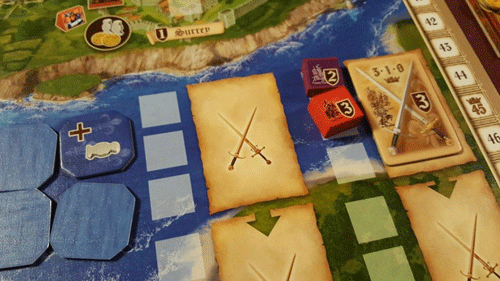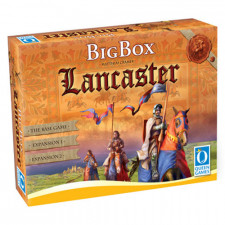Lancaster: Big Box Review
on Dec 8, 2016
Queen Games spent most of 2014 on their Big Box re-releases, each one bundling a reprint of the base game with all of its expansions into one tidy- albeit large- package. Lancaster takes on the intrigues of English court during Henry V’s time, allowing 2-5 players to scheme and jockey for the king’s favor, with some French thrown in for extra violence. With the right combination of expansions, it delivers a great time, and if you love Euros, then taking the time to find the right combo should be right up your alley, shouldn’t it?
Victory points abound, in the form of Glory, which players primarily earn by expanding their holdings and influence on the various counties’ nobility. Placing their knights on open locations allows them to choose either a noble or a unique reward from a county, or players can pay gold to claim both. Lancaster’s first innovation shows up here: giving knights varying strength values allows a competitor to knock a lower-strength knight off of a location and replace it with their own. The defeated knight returns home unharmed; it is still a Euro, after all, so the wooden tokens can’t bleed. But it does provide a refreshing and thematic way around the typical “I got there first†passive-aggressive convention.
Heading to France to fight for king and country in one or more battles is the only exception to this rule, since all Englishmen must join together in this valiant cause. So there’s no knocking others off. But there is also no real reason to cross the channel and put your knights at risk, either- at least in the base game.

Enemies of England defeated without so much as a flesh wound
When the French Army’s strength total is met or exceeded, the battle’s won and the participants share in Glory based on their strength, but the base game doesn’t offer any real penalty for not going, so “The King’s Resentment†expansion becomes a necessity for a complete game. Now, when a battle’s lost, each player who didn’t take part receives a token indicating the King’s displeasure, and must send knights to the tower before game’s end to avoid losing points. It’s a simple add-on that creates a big effect, and Lancaster shouldn’t be played without it, but it’s also the first step into the maze of expansion compatibility, thanks to the other expansions’ interaction with Lancaster’s other innovation: laws.
Each turn, players cast votes on whether to keep or replace England’s three laws, wielding their growing influence to determine what scores extra Glory. Think of it as having a say in this turn’s scoring condition in Terra Mystica, and as a strategy mechanism that finally brings theme to this particular VP salad ingredient.

Just call me the Electoral College
With the ability to see what’s next on parliament’s docket, players can tailor their strategy to benefit from new or existing proclamations, and each noble acquired brings another vote to that player’s faction. Those with power make the rules, but some of Lancaster’s expansions can cause a power surge that’s difficult to handle.
The first expansion is simple, replacing all or part of the base game’s eighteen laws with new ones, and it can function in concert with any of the others. Fairly simple, and really only for players who’ve played so much Lancaster that they’ve gotten bored with the first set of legislation. I haven’t reached that number of plays yet, but the designers must feel it’s out there, so now the number of potential laws is more than doubled, depending on how you mix and match them. The hum of excessive power begins, but the needle’s not in the red yet. Next comes the Henry V expansion, which is actually three mini- (or not so mini) expansions that can be played separately, or all together. Well, one must be played with the other two, but not all of them have to—and here we get overload.
One of them adds several new tokens, another side board where players can vie for titles by spending treasure, or even slip in and claim the spent treasure for themselves. It expands gameplay choices considerably, slowing the game down for the first few tries as the new chunk of decisions is digested and extending it somewhat for the long term. The second is the aforementioned wrath of the king for those who don’t fight the French, and the third adds eight more laws, which can only be used in concert with the other two. So you can use one or two by themselves, but not the third. One last mini-expansion brings new reward tokens that can be added to each county, giving claimants a one-time third choice for their knight’s placement and varying the game further.
All these add-ons will surely satisfy players who’ve somehow exhausted all of Lancaster’s possibilities, if they can remember the correct implementation sequence, but I find the game plays best in its base form with just the King’s Resentment included to make trips to France worthwhile. Mastering the laws and their uses allows players to transcend the puzzle on the board and focus on decoding the riddle of their opponents, and that’s when Lancaster truly shines.

 Customer Support
Customer Support  Subscribe
Subscribe 




 Account
Account  Wishlist
Wishlist 

